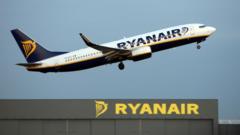German voters are prioritizing economic stability and industrial strength as they head to the polls, driven by high energy costs and regulatory pressures affecting local firms.
Germany's Economic Dilemma: Election Focus on Stagnation and Industry Struggles

Germany's Economic Dilemma: Election Focus on Stagnation and Industry Struggles
As Germany approaches its pivotal elections, economic concerns overshadow other issues, influencing voter choices.
When German voters go to the polls on Sunday, the fate of local companies like SKW Piesteritz will heavily influence their decisions. This chemical factory, struggling with ballooning energy costs and stringent regulations, recently slashed its employees' annual Christmas bonuses and shuttered one of its two ammonia plants. The impending peril of shifting production abroad looms large, threatening about 10,000 jobs in the economically depressed town of Lutherstadt Wittenberg, as highlighted by Torsten Zugehör, the local mayor, who labeled the situation a “catastrophe.”
Amidst a host of controversial topics like immigration and foreign policy concerns triggered by President Trump's actions, the primary issue weighing on voters' minds seems to be Germany’s sluggish economy. Interviews and surveys reveal a consensus among business leaders, workers, and politicians that immediate action is imperative to revitalize the nation’s flagging industrial sector. Many believe that failing to address these economic shortcomings could lead to prolonged political and economic crises.
Petr Cingr, chairman of the board at SKW, underscores the industry's sentiments, stating, “German competitiveness was never as bad as it is today.” As the country gears up for the elections, the focus remains on how its leadership will address the urgent economic challenges threatening its once-resilient industrial legacy.
Amidst a host of controversial topics like immigration and foreign policy concerns triggered by President Trump's actions, the primary issue weighing on voters' minds seems to be Germany’s sluggish economy. Interviews and surveys reveal a consensus among business leaders, workers, and politicians that immediate action is imperative to revitalize the nation’s flagging industrial sector. Many believe that failing to address these economic shortcomings could lead to prolonged political and economic crises.
Petr Cingr, chairman of the board at SKW, underscores the industry's sentiments, stating, “German competitiveness was never as bad as it is today.” As the country gears up for the elections, the focus remains on how its leadership will address the urgent economic challenges threatening its once-resilient industrial legacy.























